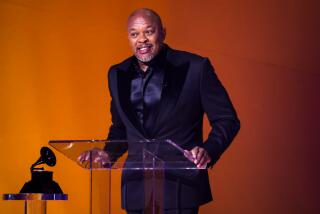Schroeder Has Brain Bleeding, Is Hospitalized
- Share via
LOUISVILLE, Ky. — William J. Schroeder, the first and only artificial heart recipient to be released from a hospital, was returned to the facility Monday after suffering a brain hemorrhage, officials said.
Schroeder, who had been described as listless and too weak to leave his bed before being admitted, was in critical, but stable condition in Humana Hospital Audubon, spokesman Robert Irvine said.
The origin of the hemorrhage was not known, he said. “We’re trying to determine what the situation is,” Irvine said.
Schroeder, who was well enough to go fishing 14 days after being released from the hospital, was returned there for a CAT scan, a test that takes pictures of the brain, said Donna Hazle, public relations director for the hospital.
Irvine said the scan indicated that Schroeder had suffered from bleeding in his brain, and that doctors believed the bleeding had stopped.
Tests were being conducted to determine if Schroeder suffered any neurological damage, Irvine said.
Earlier, Schroeder, 53, a retired weapons inspector from Jasper, Ind., had suffered mild seizures after a series of strokes Dec. 13.
He had been described by Hazle as “listless and at times bedridden” over the weekend.
Schroeder was discharged from Humana on April 6 and moved into a specially equipped apartment with his wife, Margaret. He received 24-hour nursing care.
In addition to becoming progressively weaker, Schroeder also required a blood transfusion, Hazle said. She would not say how much blood Schroeder had been given.
Dr. William C. DeVries, who implanted a Jarvik-7 unit in Schroeder on Nov. 25, has said that his patient would require one to two units of blood a month for the rest of his life. The mechanical unit, he said, tends to break down red blood cells.
Schroeder was too weak to walk more than a few steps on the day he was discharged. But he rebounded quickly and surprised DeVries and Allan M. Lansing, chairman of the Humana Heart Institute International, one week later by visiting their homes.
One week after that, he spent an afternoon at a small fishing lake near Louisville, Hazle said.
Susceptible to Seizures
DeVries has said Schroeder is susceptible to mild seizures, although his condition in early April appeared to be better controlled than it had been.
Schroeder’s speech and memory were impaired by the strokes.
On March 16, Schroeder completed his 112th day on the heart, equaling the time of the first permanent artificial heart recipient Barney Clark, who died in 1983 at the University of Utah in Salt Lake City.
Murray P. Haydon, 58, of Louisville, meanwhile, remains hospitalized at Audubon, where he still requires the help of a respirator to breathe.
Haydon Left Room
Haydon, the world’s third recipient of an artificial heart spent about 30 minutes out of his room Saturday, 15 minutes on a second-floor balcony and 15 minutes in his wife’s room, Hazle said.
Haydon, who received his artificial heart Feb. 17, has been confined to the hospital’s coronary care unit since March 18, when a delayed reaction to massive blood transfusions forced doctors to attach him to the respirator.
Jack C. Burcham, of Le Roy, Ill., was given a Jarvik-7 on April 14. He died 10 days later, at the age of 62, when a blood clot in his chest cavity impeded the flow of blood to the heart’s mechanical pumping chambers.
A Swedish man also received a Jarvik-7 heart, on April 7, at a hospital in Sweden, where he is continuing to recuperate.
More to Read
Sign up for Essential California
The most important California stories and recommendations in your inbox every morning.
You may occasionally receive promotional content from the Los Angeles Times.








